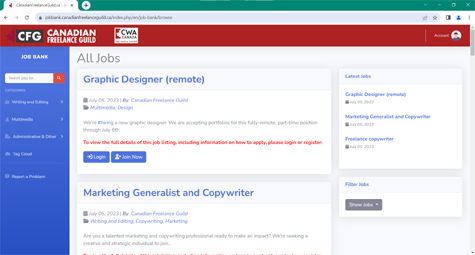The world, it seems, is going freelance. With traditional media in a state of massive restructuring, there are more independent media workers than ever before. Freelance unions (such as our own CMG Freelance) are growing and expanding to provide advocacy and support to the growing freelance ranks.
Sara Steffens has been on the front line of freelancer organizing for several years. Along with fellow journalist Rebecca Rosen Lum, she helped set up the freelance unit of her Newspaper Guild local in in the San Francisco Bay Area. In her work with Guild Freelancers, Steffens helped create a popular series of professional development events that provide low cost, high quality training. The organization helps members find health benefits plans and has also created a press pass with a credentials process. In the four years since the freelance unit began, they've signed up around 100 freelance members in the Bay area. Freelancers, Steffans says, are some of the most active members of the Newspaper Guild.
Steffens attended the recent Canadian Media Guild convention in Toronto and took the time to speak with CMG Freelance about the challenges and benefits of freelance organizing.
SB: Tell me a bit about the history of the Newspaper Guild's freelance unit.
SS: Our freelance unit started about five years ago and at the time Rebecca Rosen Lum and I had both been laid off from our newspaper jobs at the Contra Costa Times where we had both been union organizers. And in fact we were both named in the same unfair labour practice case trying to get our jobs back.
Coincidentally, or not so coincidentally, there was a big layoff at another nearby paper, the San Francisco Chronicle, at the same time, and we agreed that it was a really critical time to have a meeting and get freelancers together -- you know, while people were walking out the door at a newspaper that some of them had given decades to. So we held a pretty big meeting. I think there were maybe 40 people at that first meeting, a lot of them Chronicle people, but also just a lot of Bay Area freelancers some of whom said things like “I always thought there needed to be a group like this," or "I’ve always been wanting something like this.” And we sat in a room and brainstormed what kinds of things that we wanted to try to build together.
SB: And what are you finding that freelancers want most from Guild Freelancers?
SS: At this point community is a really big part of it. Networking. Having a place to go when a need comes up, when something comes up and you aren’t sure what to do with it. So on the email group you’ll see people asking things like “I have been offered a job but I need liability insurance. Where do I go about getting liability insurance, I’ve never done that before.” People asking for recommendations for a dentist. You know, the kind of things you might do if you were in an office with your coworkers but of course freelancers don’t share an office and don’t share coworkers.
Another big, big item is professional development. Any kind of continuing education, training, especially digital media skills but also the sort of business and entrepreneurial skills of freelancing. I think journalists who are able to work as staff in a newsroom don’t have to have the whole set of skills of “how do you pitch a story, how do you have a good relationship with a client, how do you keep track of your invoices, how do you make sure that you’re planning for your taxes.”
All of those kind of needs are really, I think, kind of overwhelming to some people when they first begin freelancing so one of our strategies is that people who have been doing it for a long time, who are really skilled at this kind of thing, will teach people who are brand new.
SB: It’s ironic, because freelancers, by nature, quite often are very independent types, so why do you think it’s this sense of community that’s attracting them and keeping them around?
SS: I do think there’s a feeling that the sort of bottom is falling out of the market. One of the things that these waves of layoffs brought was sort of a glut of top notch, very highly qualified journalists with a need for cash. So it really has driven down the market. And I think people who were doing quite well for a long time as freelancers look at that with alarm. And then people who were trying to get started as freelancers were shocked by some of the rock bottom wages that employers were offering.
So I really think it’s sort of that classic reason that people organize: the feeling that they’re going to have to do something together if they’re going to achieve something that they want. Like, if we don’t stick together and say, for instance, that we’re not going to work for free, things are going to get even worse.
SB: What are the challenges of freelance organizing? What are the obstacles you're finding you have to overcome?
SS: Well ironically it is kind of that same thing. That there is always somebody willing to do it for less. So that makes it very difficult to get some sort of traction with an employer. People have different ideas about what an acceptable wage might be. So even in trying internally in the group to set a minimum there was a lot of debate about that -- what would constitute a living wage in our area. So that's a challenge.
And just finding people. I mean I remember in the early days just reading stories and when it said somebody was a special contributor, you know, emailing the person something about the freelance group to see if they were interested. We had the advantage of having been media workers in our area and knowing the people who were out there. And the current president, Bill Snider, he's been a longtime freelancer who's also been on several newspaper staffs, so those personal connections help. But literally finding people, I think, is difficult.
And then finally it's a challenge sometimes economically for people to want to pay dues when they have variable income and sometimes very low variable income, so we've tried to find ways to let people be part of the group even if they can't right away start paying dues.
SB: What kind of timeline do you think you need to be operating on in order to build a sustainable freelance union base?
SS: It really is a longterm game. I mean it's great to have goals and to say "we're going to do this event on this day and we're going to table at X number of places and we're going to reach out to a hundred people that we've never talked to before during any certain period of time." But I've seen that it sometimes takes people a while to really understand the value of the organization and want to sign up.
You know our National Public Radio in the U.S., they're always going on the air and pitching for contributions for people to send in money, right, and I think in some ways we're like that. People might listen to NPR for years and years and years and then one day they finally pick up the phone and send in the money. I think it's a little bit like that with Guild Freelancers where you just are creating a community, you're doing this organizing work because it's important and you don't know how long it might take for somebody to actually sign up and join.
To me, though, having them be a participating member of the community and active in the things that we're trying to achieve is ultimately much more important that having them actually send us their $12 a month. So that's a harder thing to measure. We're starting to look at that now, too. What are some ways to measure activity and involvement that aren't just about, you know, did they pay the dues this month.
SB: What are your plans for expansion?
SS: Well the current president of Guild Freelancers, Bill Snider, he just sent out an announcement that they're going to do their first awards dinner. They ran a freelance awards contest this year and they got something like 150 entries which I think is very good for the first time of a contest. And they shipped the entries out of state and had other groups, other professional journalist groups judge them and brought them back. And they're going to have a cocktail party for the winners. I think that's really exciting. I think there's a huge opening there for providing sort of support and recognition and celebration of the work that freelancers are doing.
One of the things that makes this unit work really well is that while there are members around the country there's really a strong core group of people in the San Francisco Bay area. So we'd like to replicate that. We have somebody doing organizing right now in Chicago, somebody doing organizing in Washington DC, we'd love to get something going in Seattle. And hopefully find a fifth city, as well, so that we could have this going in a number of different locations and the groups can all support each other. But they can also have that local ability to run workshops and hold mixers and that kind of thing.
This unit really depends on the volunteer work of its members. And it's the members that make it vibrant and alive and a group that continues to change and be relevant.
SB: Why are freelance unions important to the labour movement?
SS: The longer that I've been working on this stuff the more obvious it seems to me that it's absolutely the answer and absolutely what we need to be doing in the labour movement.
When people are paid nothing or very little for the same kind of work we do, not only is that not for them, it's not good for us and I think people need to be reminded of that. And in the labour movement, the answer is, we organize. When that happens, when somebody's sending work someplace where they think that it's cheaper or easier to pressure somebody into accepting something substandard then we go to those people are we say "hey, you deserve better and we can help you." And that's a long tradition and this is really no different than that. We're just following the work.




